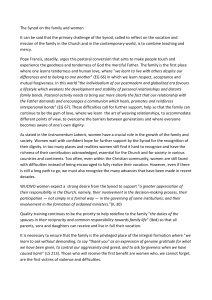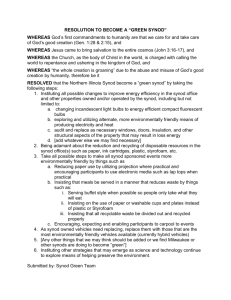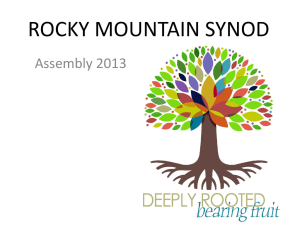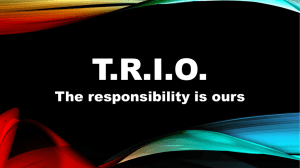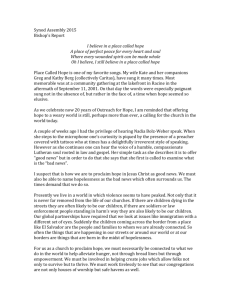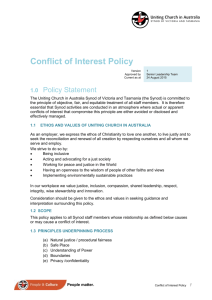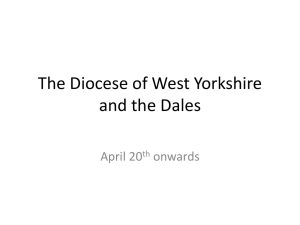Summary Report - Christian Reformed Church
advertisement
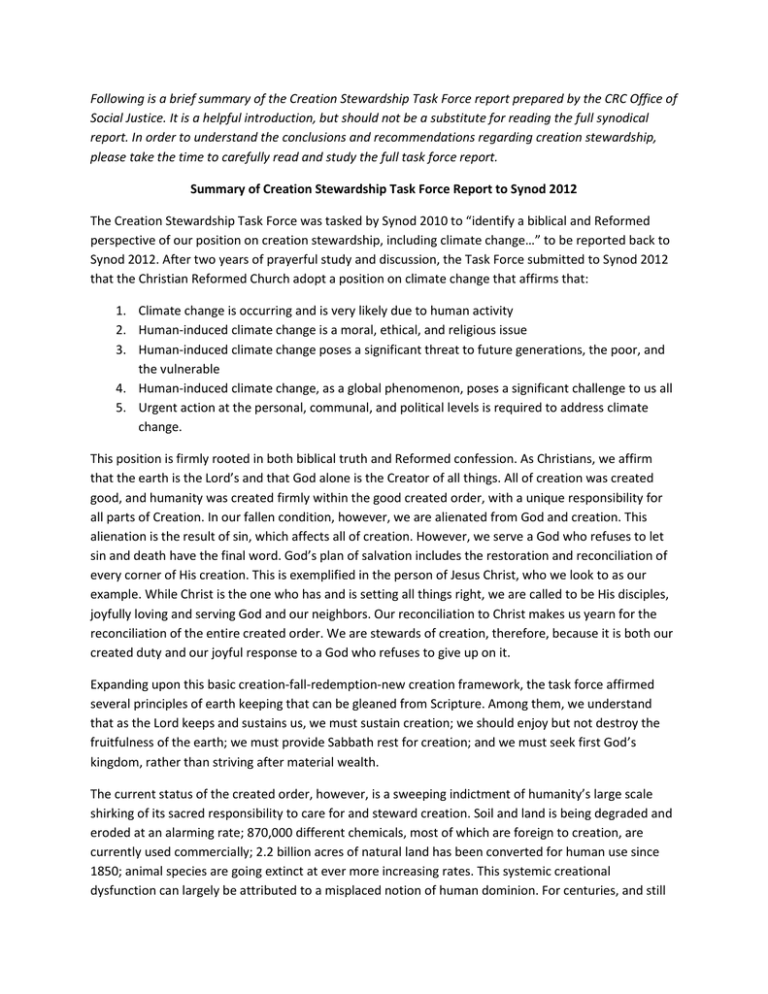
Following is a brief summary of the Creation Stewardship Task Force report prepared by the CRC Office of Social Justice. It is a helpful introduction, but should not be a substitute for reading the full synodical report. In order to understand the conclusions and recommendations regarding creation stewardship, please take the time to carefully read and study the full task force report. Summary of Creation Stewardship Task Force Report to Synod 2012 The Creation Stewardship Task Force was tasked by Synod 2010 to “identify a biblical and Reformed perspective of our position on creation stewardship, including climate change…” to be reported back to Synod 2012. After two years of prayerful study and discussion, the Task Force submitted to Synod 2012 that the Christian Reformed Church adopt a position on climate change that affirms that: 1. Climate change is occurring and is very likely due to human activity 2. Human-induced climate change is a moral, ethical, and religious issue 3. Human-induced climate change poses a significant threat to future generations, the poor, and the vulnerable 4. Human-induced climate change, as a global phenomenon, poses a significant challenge to us all 5. Urgent action at the personal, communal, and political levels is required to address climate change. This position is firmly rooted in both biblical truth and Reformed confession. As Christians, we affirm that the earth is the Lord’s and that God alone is the Creator of all things. All of creation was created good, and humanity was created firmly within the good created order, with a unique responsibility for all parts of Creation. In our fallen condition, however, we are alienated from God and creation. This alienation is the result of sin, which affects all of creation. However, we serve a God who refuses to let sin and death have the final word. God’s plan of salvation includes the restoration and reconciliation of every corner of His creation. This is exemplified in the person of Jesus Christ, who we look to as our example. While Christ is the one who has and is setting all things right, we are called to be His disciples, joyfully loving and serving God and our neighbors. Our reconciliation to Christ makes us yearn for the reconciliation of the entire created order. We are stewards of creation, therefore, because it is both our created duty and our joyful response to a God who refuses to give up on it. Expanding upon this basic creation-fall-redemption-new creation framework, the task force affirmed several principles of earth keeping that can be gleaned from Scripture. Among them, we understand that as the Lord keeps and sustains us, we must sustain creation; we should enjoy but not destroy the fruitfulness of the earth; we must provide Sabbath rest for creation; and we must seek first God’s kingdom, rather than striving after material wealth. The current status of the created order, however, is a sweeping indictment of humanity’s large scale shirking of its sacred responsibility to care for and steward creation. Soil and land is being degraded and eroded at an alarming rate; 870,000 different chemicals, most of which are foreign to creation, are currently used commercially; 2.2 billion acres of natural land has been converted for human use since 1850; animal species are going extinct at ever more increasing rates. This systemic creational dysfunction can largely be attributed to a misplaced notion of human dominion. For centuries, and still today, humans have appropriated a misunderstood definition of dominion to justify their exploitation and domination of creation. Instead, our definition of dominion must be informed by God’s love for his entire created order and by the self-sacrificing servant hood of Jesus Christ. Allowing these biblical and confessional foundations, along with a clear-eyed assessment of the current status of creation, to inform its work, the task force focused much of the rest of its attention on the issues presented by climate change, and how we should respond to them. Sections VII and VIII (Appendix A is the expanded, more detailed version of these sections) of the report deal deeply with these questions and are worth careful reading and discussion. The task force examined three crucial cycles at work in the climate system: the heat exchange cycle, the water cycle, and the carbon cycle. Their conclusion, rendered from both observable phenomena and from carefully collected data over time, was that, largely due to human consumption of fossil fuels and the resultant emissions of greenhouse gases, all three of these cycles are out of equilibrium. The result is a climate system, created to be in harmony and rhythm, that is dissonant and out of step. This means that more carbon and more water vapor is in the atmosphere, less is being recycled out, and, resultantly, less heat is being exchanged out of our atmosphere. This leads to warmer global temperatures. The practical effects of warmer global temperatures are more complex than simply warmer summers, milder winters, and longer growing seasons. Because the earth’s surface climate is so diverse (compare the Canadian Yukon Territory to the African Sahel), the effects of warmer global temperatures manifest themselves in similarly diverse ways. A warming world is one in which sea levels will rise, the ocean will become more acidic, agricultural zones will shift, deserts will get larger, and rainy areas will get even wetter. The reality of climate change will be a challenge for all people, but it will be the people of poorer nations that lack the money and infrastructure to adapt to the challenges of climate change who will bear the brunt of its effects. As Christians called to love and care for our neighbor, this should be deeply troubling. Responding to climate change is then not only about obeying a stewardship command (though it is certainly that); it is fundamentally an act of justice. In light of its conclusions, the task force presented several recommendations to synod as a way to move forward in faithfulness and deliberation. These included: That synod affirm the task force’s conclusions detailed in the first paragraph of this summary That synod call upon churches, members, and denominational bodies to be voices for justice and public examples of living sustainably, promoting stewardship, and seeking justice for the poor and vulnerable among us That synod call upon churches and their members to reduce individual and collective carbon emissions to the atmosphere That synod call upon churches and their members to consider and advocate for public strategies to reduce carbon emissions and move us toward very low or zero net emissions That synod request members of the task force to make themselves available for the following year for forums, discussions, and educational sessions around the denomination That synod commend the report to churches as a guide for prayer and for direct action and advocacy when and where appropriate All recommendations were adopted by synod and are now in the process of being carried out by various offices and agencies of the Christian Reformed Church. In Section VIII, the task force seeks to leave the reader with some practical steps forward. How are we to integrate this knowledge into our everyday lives? What actions can we take as individuals and as churches to address climate change? For individuals, the task force suggests a four step progression: prayer, awareness of creation, appreciation of the created order, and stewardship of creation. For churches, the task force offers options such as taking an inventory of your church’s present creation care activities, brainstorming ideas for how to better incorporate creation care into the life of your church, choosing one or two of those options and to carry them out! For more in depth suggestions, a careful reading of Section VIII is encouraged. As Christians called to care for creation and for the least among us, we are to respond to the degradation of our environment and the serious challenges posed by climate change, particularly to the poorest and most vulnerable. It is our hope that this report will help deepen our conversation on these critical issues and motivate us to prayerful, deliberative, restorative actions.
